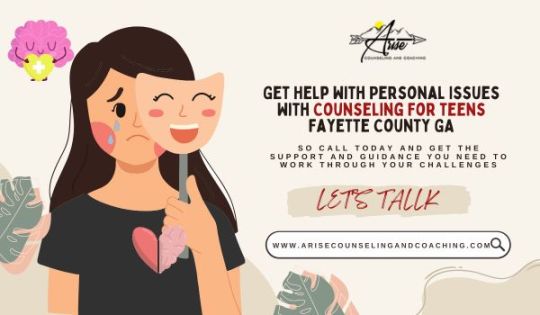#Counseling for Teens
Text
Counseling For Teens

Teen counseling at our institute offers vital support during the tumultuous journey of adolescence. Whether triggered by family transitions like divorce, relocation, or bereavement, or exacerbated by the pressures of anxiety and academic overachievement, teens often find themselves grappling with a myriad of emotions. Counseling For Teens
0 notes
Text
Counseling For Teens

At The Institute of Mindful Therapy Inc., we recognize the unique challenges that teenagers face in today's complex world. From navigating family changes to managing academic pressure, anxiety, and stress, adolescents often find themselves grappling with a multitude of emotions and uncertainties. That's why we're dedicated to providing a safe and nurturing space specifically tailored to the needs of teens. Our teen counseling program offers a supportive environment where adolescents can freely express themselves, seek guidance, and receive emotional support from trained professionals. Through individual therapy sessions, group activities, and specialized workshops, we empower teens to explore their feelings, develop coping strategies, and build resilience. Our goal is to help teenagers navigate life's ups and downs with confidence and self-awareness, fostering a sense of empowerment and well-being that extends far beyond their time with us. At The Institute of Mindful Therapy Inc., we're committed to being a trusted ally in the journey toward teenage mental health and flourishing.
Counseling For Teens
1 note
·
View note
Text
Get Help With Personal Issues With Counseling For Teens Fayette County GA

If you are facing too many personal issues and want help to stay strong during tough times, counseling for teens Fayette County GA from Arise Counseling and Coaching can help you! So call today and get the support and guidance you need to work through your challenges.
#counseling for teens#business coaching#family counseling#relationship coach#relationship counselor#counselor for work stress#counseling for anxiety
0 notes
Text
Teen Therapy in Boca Raton, FL
At Lift Wellness Group we take a therapeutic approach specifically for teens. Teens participate in talk therapy in a safe environment with a mental health professional with the goal to comprehend, communicate and express their feelings, uncover and solve problems, and develop healthy coping mechanisms. Lift provides one-on-one talk therapy sessions and group therapy.
Having your teen talk to a skilled therapist can provide the crucial help and support they need in this crucial period of their life.
When Does a Teen Need Counseling?

Therapy can support your teen through a variety of things, such as self-discovery, stress, life events, or mental health issues. Therapy can also be used to prevent minor issues from turning into problems later on.
Sometimes, even just a few therapy sessions can make a big difference to your teen’s overall well-being. Common reasons and conditions for which teens go to counseling include:
Anxiety disorders
Attention-deficit/hyperactivity disorder (ADHD)2
Autism
Behavioral problems
Coping with a chronic health condition
Cultural or racial discrimination
Depression
Discovering sexuality, sexual orientation, and/or gender identity
Eating disorders
Grief
Loneliness
Obsessive-compulsive disorder (OCD)
Personality disorders
Problems with self-awareness, self-esteem, or self-worth
Relationship problems
School and social-related issues like bullying
Self-harm, suicidal thoughts, or risky behaviors
Stress management
Substance use
Trauma
We treat all of the above and more through the following types of Psychotherapies:
Cognitive behavioral therapy (CBT): Often used for teens with anxiety, depression, or trauma, a therapist specializing in CBT will help your teen identify harmful thought patterns and replace them with more positive ones.
Dialectical behavior therapy (DBT): DBT will help your teen take responsibility for and find healthier ways of coping with conflict and intense emotions. DBT is often used for teens who engage in self-harm, who are suicidal, and/or teens with borderline personality disorder (BPD).
Family therapy: Family therapy includes one or more members of the family, including parents, grandparents, and siblings. The goal of this type of therapy is to improve communication and support among family members.
Group therapy: In group therapy, multiple patients are led by a therapist. This approach can improve your teen's social skills and help them learn how other teens constructively cope with mental health issues.
Interpersonal therapy (IPT): Commonly used for people with depression, IPT focuses on a person's relationships, addressing relationship problems and how interpersonal events affect emotions.
Mentalization based therapy (MBT): MBT helps children and teens who are struggling with their identity and with who they are.
Supportive therapy: Supportive therapy helps teens address and cope with problems in a healthy way as well as improve their self-esteem.
Trauma-informed therapy; is care in which our mental healthcare providers here at lift engage with a client in a manner that allows for implementation of an effective treatment process without re-traumatization. Trauma-informed care requires understanding that the trauma people experience in the past can negatively impact their current life. A trauma-informed approach involves adherence to principles for practice that ensure understanding and sensitivity to trauma-related issues regardless of an individual’s current presenting concerns.
Schedule An Appointment now!
0 notes
Text
Might proctor some SATs at the HS my mom teaches at 👍
#It's really weird being trans and knowing so many teachers lmao#I keep getting offered jobs by people who've known me since I was a kid and then being like... Idk if they'd actually hire me#Smth like this is fine... But I was gonna do aftercare because they pay like $30/hr#And then I asked the woman who reccomended it and she said don't do it for middle or high school#Cause they're gonna ask if you're a lesbian and if you answer the wrong way you'll get in trouble#It wouldn't have worked out for other reasons but that was definitely one of them#Same for no longer camp counseling. Could probably find a good job and I have experience#But idk if any camp would actually hire me except the one I worked at as a teen. And the woman who ran it retired last year#So even with her recommendation they might reject me. Shit sucjs#Just. All my work experience is working with children. Plus my internship. So all of my connection are childcare and education
4 notes
·
View notes
Text
I will protect every one of my queer clients at all costs, especially the young ones. If I need to yell at twenty people on their behalf because pronouns and names aren’t being respected then so be it. No misgendering is allowed on my watch.
#queer#queer youth#queer teens#protect queer kids#trans#fuck transphobia#trans rights#trans rights are human rights#leftist counselor#queer counselor#counseling#mental health matters#therapy#therapist#pronouns#misgendering#respect pronouns#leftist#mental healthcare#pride#pride month#queer pride#leftblr#human rights
44 notes
·
View notes
Text
i go insane like once a week but looking at therapy costs has me like -_- mannn . gotta limit myself to once a month insanity. maybe twice a month
#makes me so much more grateful for the free weekly counselling i got as a teen#espeically because god damn those counsellors were good
1 note
·
View note
Text
my aunt offered to pay for my therapy (with an actual therapist!!!) starting from september good god this is such a big fucking deal for me i'm so relieved...
#she also confirmed that my mom and brother are gaslighting and abusing me so that's also a relief#like i know i'm not crazy and they don't have a reason to pick on me but i needed another person to tell me you know#also for context: i've been begging my parents for me to go to therapy since EARLY MIDDLE SCHOOL but my dad was so against it he had to get#the lawyers involved. so i've cruised around free counseling. to no avail because it sucked#people would just let me talk and just nod and say nothing... one even tried to get me on meds for a reason unrelated to why i would#actually need meds lol... and another one was a literal priest so as an openly bisexual teen it was not the best experience#it's the same place where she used to go so i'm pretty confident
10 notes
·
View notes
Text
Everyday I suffer the consequences of my mother never getting me a bit of help for my ocd and everyday I believe she deserves to have her ass beat for it
#vent#no medication no counseling nothing#she let those papers sit for years and i didnt know until i was almost a teen#and yet you shoved adhd meds down my throat for years#why did you think that was a problem but not my fucking ocd too#girl fuck you#i hate you
2 notes
·
View notes
Text
Let’s Talk About It... - August 29th, 2022
In our culture there are topics that people often find difficult to talk about. Parents could certainly make a list of the difficult topics they struggle to know how to broach. There is even some concern that by talking about difficult topics that we are planting a seed or the idea and that could in some way be harmful to our children. While it is important to always consider a child’s age and developmental level, it is equally important to educate and communicate with our youth, even when the topic up for discussion is difficult. In this blog, I will discuss suicide prevention measures and why it is so important. Suicide is the second leading cause of death for our youth. According to the National Alliance on Mental Illness, nearly 20% of high-school students report serious thoughts of suicide and as many as 9% have made an attempt. Adolescents are vulnerable for many reasons, including their developmental level and social stressors.

Because teens are often influenced by other teens it is important to teach young people how to recognize warning signs (clues) that a person considering suicide may display. The following list provides examples of warning signs that our youth should be able to recognize:
Loss of interest/pleasure in activities
Giving away possessions
Dropping hints/clues that you may not be here very much longer
Expressing desire to die or not be a burden to others
Expressing feelings of sadness, hopelessness, or having no reasons to live
Suicidal behaviors that may include making a plan and/or doing something in preparation of ending one’s life
Change in behaviors, such as being risky
Using drugs or alcohol
Situational Clues – change in living situation, lose a job, failing in school, break-up, parents are divorcing, etc.
Equally important is helping youth know how to respond if they begin to pick up on ‘clues’ from their friends. If you recognize warning signs it is important that you TALK ABOUT IT. Asking someone if they are contemplating ending their life will NOT harm the person. If you cannot find the words and feel too uncomfortable then find someone else to ask. How you ask doesn’t matter, what matters is that you ASK.

Teaching your teen about the prevalence of suicide and how to respond if they or someone they care about is considering ending their life could be a LIFE-SAVING LESSON. Reminding teens that problems are temporary and can be solved, no matter how difficult they may seem can give teens HOPE. Talking about difficult topics, like Teen Suicide can give youth the tools they need to preserve LIFE.

Staci Holderman, MA, LPCC-S
#Children and Family Counseling Associates Inc#Children and Family Counseling Associates#Children and Family Counseling Associates Inc.#cafca#CAFCA Inc#CAFCA Inc.#Staci Holderman#mental health#mental health support#mental health resource#mental health awareness#suicide prevention#suicide awareness#National Suicide Prevention#teens#teenager#Teenagers#adolescent#Harrodsburg#Kentucky#august#2022
2 notes
·
View notes
Text
A Guide to Supporting Adolescents' Mental Well-being
In the tumultuous journey of adolescence, where hormones rage and emotions fluctuate like a rollercoaster, navigating the complexities of mental health can be particularly challenging. Teen counseling emerges as a beacon of support, offering guidance and strategies to help adolescents cope with the ups and downs of life. In this comprehensive guide, we delve into the significance of teen counseling, effective strategies, and available resources to nurture the mental well-being of teenagers.
Understanding Teen Counseling
Teen counseling encompasses a range of therapeutic interventions tailored specifically to address the unique needs of adolescents. Whether grappling with academic stress, peer pressure, familial conflicts, or mental health disorders, counseling provides a safe space for teenagers to explore their feelings, thoughts, and concerns. It fosters self-awareness, resilience, and coping skills essential for navigating the complexities of adolescence.
Why Teen Counseling Matters
During adolescence, individuals undergo profound physical, cognitive, and emotional changes, laying the foundation for their future well-being. However, this developmental phase is also characterized by heightened vulnerability to mental health issues such as anxiety, depression, and substance abuse. Teen counseling plays a pivotal role in early intervention and prevention, equipping adolescents with the necessary tools to manage challenges effectively.
Benefits of Teen Counseling
Emotional Support: Counseling offers adolescents a supportive environment to express their emotions without fear of judgment. Through empathetic listening and validation, counselors foster trust and facilitate emotional healing.
Skill Development: Teen counseling equips adolescents with essential life skills such as problem-solving, communication, and stress management. These skills empower teenagers to navigate interpersonal relationships and cope with academic and social pressures.
Positive Coping Mechanisms: Adolescents often resort to unhealthy coping mechanisms such as substance abuse or self-harm to alleviate emotional distress. Counseling promotes the adoption of positive coping strategies, encouraging healthier ways of managing emotions and conflicts.
Improved Relationships: Effective communication and conflict resolution are vital for healthy relationships. Teen counseling provides adolescents with tools to enhance their interpersonal skills, fostering meaningful connections with peers, family, and authority figures.
Mental Health Awareness: By destigmatizing mental health issues and promoting self-awareness, teen counseling encourages early identification and intervention of psychological problems. This proactive approach facilitates timely access to appropriate support and resources.
Effective Strategies in Teen Counseling
Cognitive-Behavioral Therapy (CBT): CBT is a widely utilized therapeutic approach in teen counseling, focusing on identifying and challenging negative thought patterns and behaviors. Through structured sessions and practical exercises, adolescents learn to reframe their perspectives and develop healthier coping mechanisms.
Mindfulness and Relaxation Techniques: Mindfulness practices, such as meditation and deep breathing exercises, help adolescents cultivate present-moment awareness and reduce stress levels. Integrating relaxation techniques into teen counseling promotes emotional regulation and enhances overall well-being.
Family Therapy: Family dynamics significantly influence adolescents' mental health and behavior. Family therapy involves sessions where adolescents and their family members explore underlying issues, improve communication, and strengthen familial bonds. This collaborative approach fosters a supportive home environment conducive to teenagers' psychological growth.
Peer Support Groups: Adolescents often find solace and validation in peer support groups where they can connect with others facing similar challenges. Peer-led discussions, group activities, and shared experiences create a sense of belonging and reduce feelings of isolation.
Creative Arts Therapy: Incorporating creative expression, such as art therapy, music therapy, or drama therapy, into teen counseling provides alternative avenues for self-expression and exploration. Engaging in creative activities facilitates emotional processing and can be particularly beneficial for adolescents who struggle to articulate their feelings verbally.
Available Resources for Teen Counseling
School Counselors: Many schools offer counseling services provided by trained professionals who support students' academic, social, and emotional well-being. School counselors serve as valuable resources for adolescents seeking guidance and support in navigating school-related stressors and personal challenges.
Community Mental Health Centers: Community-based mental health centers often offer affordable counseling services for adolescents and their families. These centers may provide individual therapy, group therapy, and psychoeducational workshops tailored to teenagers' needs.
Online Counseling Platforms: With the rise of telehealth services, online counseling platforms offer convenient and accessible support for adolescents seeking mental health services. Virtual counseling sessions conducted via video conferencing or messaging platforms enable teenagers to connect with licensed therapists from the comfort of their homes.
Hotlines and Helplines: Crisis hotlines and helplines provide immediate support and intervention for adolescents experiencing mental health crises or emotional distress. These confidential services offer a lifeline for teenagers in crisis, connecting them with trained counselors and resources 24/7.
Supportive Websites and Apps: Numerous websites and mobile applications provide valuable resources, information, and self-help tools for adolescents struggling with mental health issues. From mindfulness exercises to mood tracking apps, these digital platforms offer additional support and guidance beyond traditional counseling.
Conclusion
In the intricate tapestry of adolescence, where every thread represents a unique experience, teen counseling emerges as a guiding thread, weaving resilience, self-awareness, and hope into the fabric of adolescents' lives. By fostering emotional support, skill development, and positive coping mechanisms, counseling empowers teenagers to navigate the complexities of adolescence with strength and resilience. With a myriad of effective strategies and resources at their disposal, adolescents can embark on their journey towards mental well-being with confidence and optimism.
1 note
·
View note
Text
Counseling For Teens

Your emphasis on the importance of teen counseling and providing a safe space for adolescents is very commendable. The challenges that teenagers face, including family changes, academic pressure, anxiety, and stress, can have a profound impact on their emotional well-being. Offering them a dedicated space where they can express themselves, seek guidance, and find emotional support can be incredibly valuable.
Counseling For Teens
1 note
·
View note
Text
Teen Counseling: A Guide to Supporting Your Teen's Mental Health
As a parent, watching your teen navigate the ups and downs of adolescence can be challenging. It's a time of significant change, growth, and discovery, but it can also be a period of stress, confusion, and emotional turmoil. Teen counseling can play a crucial role in helping young people manage their mental health, build resilience, and develop healthy coping strategies.
What is Teen Counseling?
Teen counseling is a type of therapy specifically designed to address the unique challenges faced by adolescents. It provides a safe, confidential space where teens can express their thoughts and feelings, work through issues, and develop skills to handle life's difficulties. Counselors who specialize in working with teens are trained to understand the developmental stages of adolescence and the common issues that arise during this time.
Why is Teen Counseling Important?
Adolescence is a critical period for mental health. According to the National Institute of Mental Health, one in five teens experiences a mental health disorder, such as anxiety, depression, or behavioral problems. Early intervention through counseling can help prevent these issues from becoming more severe and can provide teens with the tools they need to thrive.
Common Issues Addressed in Teen Counseling
Teen counseling can address a wide range of issues, including:
Anxiety and Depression: Many teens experience intense stress and sadness. Counseling can help them understand their emotions and develop healthy ways to manage them.
Self-Esteem and Body Image: Adolescents often struggle with self-esteem and body image issues. A counselor can help teens build a positive self-image and develop confidence.
Family and Peer Relationships: Teens may have conflicts with family members or peers. Counseling can improve communication skills and help resolve conflicts.
Academic Pressure: The pressure to perform well in school can be overwhelming. Counselors can teach time management and stress reduction techniques.
Substance Abuse: Some teens may experiment with drugs or alcohol. Counseling can address these behaviors and promote healthy choices.
Benefits of Teen Counseling
The benefits of teen counseling are numerous and can have a lasting impact on a young person's life. Some of the key benefits include:
Improved Emotional Regulation: Teens learn how to manage their emotions and reactions in healthy ways.
Better Communication Skills: Counseling helps teens articulate their thoughts and feelings more effectively.
Increased Self-Awareness: Teens gain a better understanding of themselves and their behaviors.
Enhanced Problem-Solving Abilities: Counseling teaches teens how to approach and resolve issues constructively.
Stronger Relationships: Improved communication and conflict resolution skills lead to healthier relationships with family and peers.
How to Find the Right Teen Counselor
Finding the right counselor for your teen is crucial for the success of the therapy. Here are some tips to help you make the right choice:
Check Credentials: Ensure the counselor is licensed and has experience working with teens.
Seek Recommendations: Ask your child's school, pediatrician, or other parents for recommendations.
Consider the Counselor's Approach: Different counselors use different therapeutic approaches. Find one that aligns with your teen's needs.
Meet the Counselor: Arrange a meeting to see if your teen feels comfortable with the counselor.
Evaluate Progress: Regularly check in with your teen and the counselor to ensure the therapy is effective.
Encouraging Your Teen to Attend Counseling
Teens may be hesitant to attend counseling. It's essential to approach the topic with sensitivity and understanding. Here are some tips to encourage your teen to give counseling a try:
Normalize Counseling: Explain that many people seek counseling for various reasons and that it's a normal part of taking care of one's mental health.
Address Concerns: Listen to your teen's concerns about counseling and address them openly.
Highlight Benefits: Talk about the positive outcomes of counseling, such as feeling better and learning new skills.
Offer Support: Assure your teen that you support them and are there to help.
Conclusion
Teen counseling can be a vital resource for adolescents struggling with mental health issues, stress, or life challenges. By providing a supportive environment and expert guidance, counseling helps teens navigate this turbulent period and emerge stronger, more resilient, and better equipped to face the future. If you notice your teen struggling, consider reaching out to a professional counselor. It could make a significant difference in their well-being and overall development.
0 notes
Text
Counseling for Teen in Boca Raton, FL
At Lift Wellness Group we take a therapeutic approach specifically for teens. Teens participate in talk therapy in a safe environment with a mental health professional with the goal to comprehend, communicate and express their feelings, uncover and solve problems, and develop healthy coping mechanisms. Lift provides one-on-one talk therapy sessions and group therapy.
Having your teen talk to a skilled therapist can provide the crucial help and support they need in this crucial period of their life.
When Does a Teen Need Counseling?

Therapy can support your teen through a variety of things, such as self-discovery, stress, life events, or mental health issues. Therapy can also be used to prevent minor issues from turning into problems later on.
Sometimes, even just a few therapy sessions can make a big difference to your teen’s overall well-being. Common reasons and conditions for which teens go to counseling include:
Anxiety disorders
Attention-deficit/hyperactivity disorder (ADHD)2
Autism
Behavioral problems
Coping with a chronic health condition
Cultural or racial discrimination
Depression
Discovering sexuality, sexual orientation, and/or gender identity
Eating disorders
Grief
Loneliness
Obsessive-compulsive disorder (OCD)
Personality disorders
Problems with self-awareness, self-esteem, or self-worth
Relationship problems
School and social-related issues like bullying
Self-harm, suicidal thoughts, or risky behaviors
Stress management
Substance use
Trauma
We treat all of the above and more through the following types of Psychotherapies:
Cognitive behavioral therapy (CBT): Often used for teens with anxiety, depression, or trauma, a therapist specializing in CBT will help your teen identify harmful thought patterns and replace them with more positive ones.
Dialectical behavior therapy (DBT): DBT will help your teen take responsibility for and find healthier ways of coping with conflict and intense emotions. DBT is often used for teens who engage in self-harm, who are suicidal, and/or teens with borderline personality disorder (BPD).
Family therapy: Family therapy includes one or more members of the family, including parents, grandparents, and siblings. The goal of this type of therapy is to improve communication and support among family members.
Group therapy: In group therapy, multiple patients are led by a therapist. This approach can improve your teen's social skills and help them learn how other teens constructively cope with mental health issues.
Interpersonal therapy (IPT): Commonly used for people with depression, IPT focuses on a person's relationships, addressing relationship problems and how interpersonal events affect emotions.
Mentalization based therapy (MBT): MBT helps children and teens who are struggling with their identity and with who they are.
Supportive therapy: Supportive therapy helps teens address and cope with problems in a healthy way as well as improve their self-esteem.
Trauma-informed therapy; is care in which our mental healthcare providers here at lift engage with a client in a manner that allows for implementation of an effective treatment process without re-traumatization. Trauma-informed care requires understanding that the trauma people experience in the past can negatively impact their current life. A trauma-informed approach involves adherence to principles for practice that ensure understanding and sensitivity to trauma-related issues regardless of an individual’s current presenting concerns.
Schedule An Appointment now!
1 note
·
View note
Text
Marriage Counselling and Child Psychotherapist in Hamilton
Is your marriage facing difficulties? Does your child need emotional support? Our Hamilton-based therapists offer confidential marriage counselling to help couples reconnect and child psychotherapy to empower young minds. We specialize in communication, trust-building, and fostering a healthy family environment. Call today for a consultation.
Learn more at - https://familymatterscentre.ca/counsellors-and-therapists-hamilton/
#child counsellors#child counselling services#marriage#couple therapy#child counselling#pschotherapists#separation anxiety#teen counselling services
0 notes
Text

Strengthening Relationships in Glendale Arizona - Premier Insight Counseling
Marriage, a sacred bond that weaves two lives together, often encounters challenges that require patience, understanding, and support. In Glendale, Arizona, the pressures of modern life, cultural dynamics, and individual differences can put a strain on relationships. This blog delves into the significant role of marriage counseling in strengthening relationships and how seeking professional help can positively impact couples in the unique context of Glendale. https://www.premierinsightcounseling.com/blog/1115397-the-role-of-marriage-counseling-in-strengthening-relationships-in-glendale-arizona
#teenager therapist near me#adolescence counseling peoria#emdr therapy peoria az#teen therapists peoria az#psycho therapists peoria az#psychotherapist for teenager
0 notes